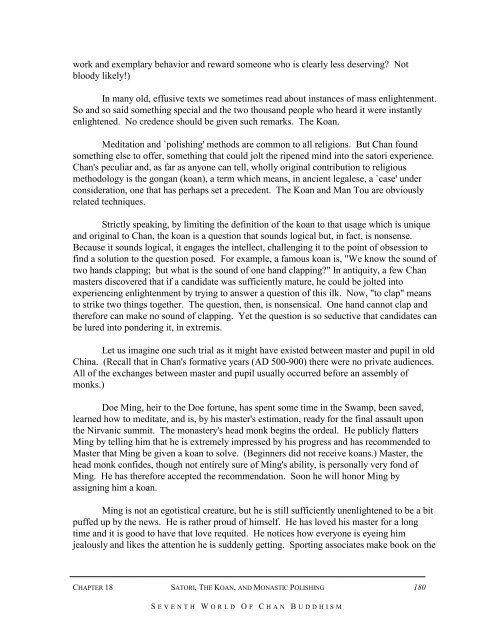seventh world of chan buddhism - Zen Buddhist Order of Hsu Yun
seventh world of chan buddhism - Zen Buddhist Order of Hsu Yun
seventh world of chan buddhism - Zen Buddhist Order of Hsu Yun
Create successful ePaper yourself
Turn your PDF publications into a flip-book with our unique Google optimized e-Paper software.
work and exemplary behavior and reward someone who is clearly less deserving? Not<br />
bloody likely!)<br />
In many old, effusive texts we sometimes read about instances <strong>of</strong> mass enlightenment.<br />
So and so said something special and the two thousand people who heard it were instantly<br />
enlightened. No credence should be given such remarks. The Koan.<br />
Meditation and `polishing' methods are common to all religions. But Chan found<br />
something else to <strong>of</strong>fer, something that could jolt the ripened mind into the satori experience.<br />
Chan's peculiar and, as far as anyone can tell, wholly original contribution to religious<br />
methodology is the gongan (koan), a term which means, in ancient legalese, a `case' under<br />
consideration, one that has perhaps set a precedent. The Koan and Man Tou are obviously<br />
related techniques.<br />
Strictly speaking, by limiting the definition <strong>of</strong> the koan to that usage which is unique<br />
and original to Chan, the koan is a question that sounds logical but, in fact, is nonsense.<br />
Because it sounds logical, it engages the intellect, challenging it to the point <strong>of</strong> obsession to<br />
find a solution to the question posed. For example, a famous koan is, "We know the sound <strong>of</strong><br />
two hands clapping; but what is the sound <strong>of</strong> one hand clapping?" In antiquity, a few Chan<br />
masters discovered that if a candidate was sufficiently mature, he could be jolted into<br />
experiencing enlightenment by trying to answer a question <strong>of</strong> this ilk. Now, "to clap" means<br />
to strike two things together. The question, then, is nonsensical. One hand cannot clap and<br />
therefore can make no sound <strong>of</strong> clapping. Yet the question is so seductive that candidates can<br />
be lured into pondering it, in extremis.<br />
Let us imagine one such trial as it might have existed between master and pupil in old<br />
China. (Recall that in Chan's formative years (AD 500-900) there were no private audiences.<br />
All <strong>of</strong> the ex<strong>chan</strong>ges between master and pupil usually occurred before an assembly <strong>of</strong><br />
monks.)<br />
Doe Ming, heir to the Doe fortune, has spent some time in the Swamp, been saved,<br />
learned how to meditate, and is, by his master's estimation, ready for the final assault upon<br />
the Nirvanic summit. The monastery's head monk begins the ordeal. He publicly flatters<br />
Ming by telling him that he is extremely impressed by his progress and has recommended to<br />
Master that Ming be given a koan to solve. (Beginners did not receive koans.) Master, the<br />
head monk confides, though not entirely sure <strong>of</strong> Ming's ability, is personally very fond <strong>of</strong><br />
Ming. He has therefore accepted the recommendation. Soon he will honor Ming by<br />
assigning him a koan.<br />
Ming is not an egotistical creature, but he is still sufficiently unenlightened to be a bit<br />
puffed up by the news. He is rather proud <strong>of</strong> himself. He has loved his master for a long<br />
time and it is good to have that love requited. He notices how everyone is eyeing him<br />
jealously and likes the attention he is suddenly getting. Sporting associates make book on the<br />
CHAPTER 18 SATORI, THE KOAN, AND MONASTIC POLISHING<br />
S EVENTH W ORLD O F C HAN B UDDHISM<br />
180


